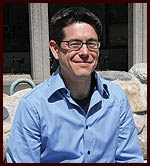February 4, 2009
Densho’s work in documenting the Japanese American community is on the cutting edge of humanities practice. We have delved into issues of memory and collective interpretation in our oral history work, and have examined the tension between im
 migrant cultures and conceptions of American identity. In the post-9/11 world, the stories of our narrators and the primary sources in the archive provided a stark lesson about the fragility of civil liberties in times of crisis. While not all of these areas of study are new, we have been able to apply technology to both find novel connections within the body of work and to make our materials available to a vastly larger audience than was ever possible before. To play a role in crafting that work was exciting and challenging.
migrant cultures and conceptions of American identity. In the post-9/11 world, the stories of our narrators and the primary sources in the archive provided a stark lesson about the fragility of civil liberties in times of crisis. While not all of these areas of study are new, we have been able to apply technology to both find novel connections within the body of work and to make our materials available to a vastly larger audience than was ever possible before. To play a role in crafting that work was exciting and challenging.
But more important, my job at Densho afforded me a personal journey into my own heritage, a history I had not really explored. When I watch the interviews in the archive, I see the faces of my family, my aunts and uncles, and my mother. I wonder what my grandfather Toru and grandmother Miye thought as they arrived at Tule Lake, younger than my wife and I are today. I never had the chance to ask them; but I am a bit closer to their experience through the stories of our narrators.
Densho was an extraordinary part of my life, and I will always feel gratitude towards the people who made and continue to make the work possible. My thanks to Densho’s supporters everywhere — in the schools, in the community, and across the country. But I owe the most to my family at Densho, all of the talented, dedicated staff members I have known over the years. Virginia, Dana, Patricia, Naoko, and Tom, I will see you again, but will still miss working with you every day.
Thank you again for the opportunity and I look forward to watching the next chapter unfold at Densho.
— Geoff